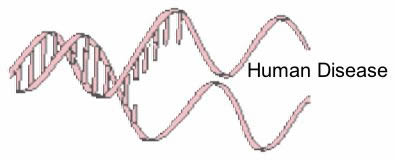Fragile X, Angelman, Prader-Willi, Rett, and ICF syndromes are inherited human diseases with epigenetic abnormalities that influence DNA methylation; many cancers have abnormal DNA methylation that arises somatically. Of these diseases our main focus is Fragile X Syndrome.
Our early work on epigenetics through DNA methylation and delayed DNA replication, and application of these concepts to fragile X syndrome, is described in Epigenetics.
Our new methods allow us to ask fragile-X-related questions concerning the significance of the variations in the levels of methylation. For example, there is often cell-to-cell mosaicism in the degree of methylation of the FMR1 promoter. The proportion of cells with hypomethylated FMR1 promoters is positively correlated with IQ scores, as would be expected if these cells with hypomethylated alleles are transcriptionally active and making significant amounts of FMR1 protein. This degree of mosaicism can range from less than a few percent to 100% of cells (Stöger et al., 1997).
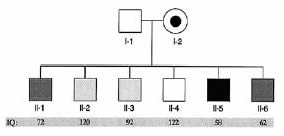
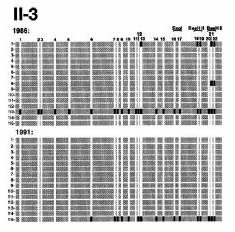
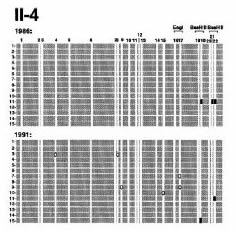
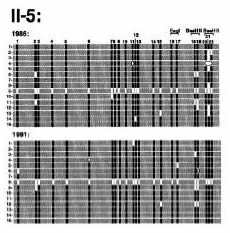
How does this mosaicism arise? Why are there differences in methylation frequencies among different CpG sites within hypermethylated alleles?
We are also examining the possible levels of methylation mosaicism that may exist in cells from individuals with fragile X syndrome. Recent data from Tassone et al. (2001) indicate that some males whose expanded FMR1 alleles appear to be densely methylated have significant levels of FMR1 mRNA. Our analysis of methylation mosaicism using our new methods of double-strand PCR will help us distingish mosaicism between cells, between strands of DNA, and among CpG sites of the FMR1 promoter region.
![]()
We also continue our interest in Immune deficiency, Centrochromatin and Facial abnormalities (ICF) Syndrome. This disease usually results from point mutations in the gene encoding DNA-methyltransferase 3B (DNMT3B) (Hansen et al., 2000). Patterns of abnormal CpG island methylation are observed in these cells (Hansen et al., 2000). Our new methods will help us to understand how methylation patterns may be reduced and, possibly, increased, in these cells.
The Laird Lab has published in others areas of Human Disease.
